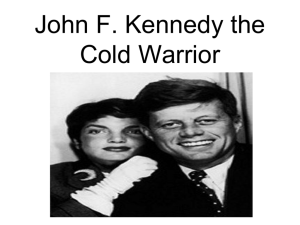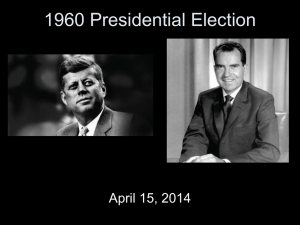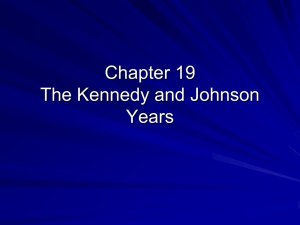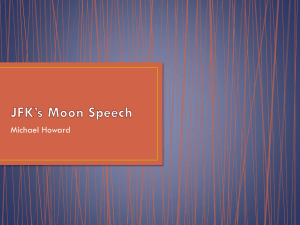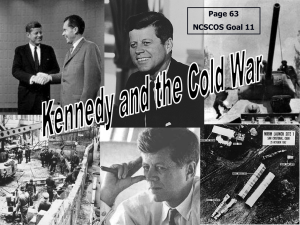CHAPTER 28
advertisement
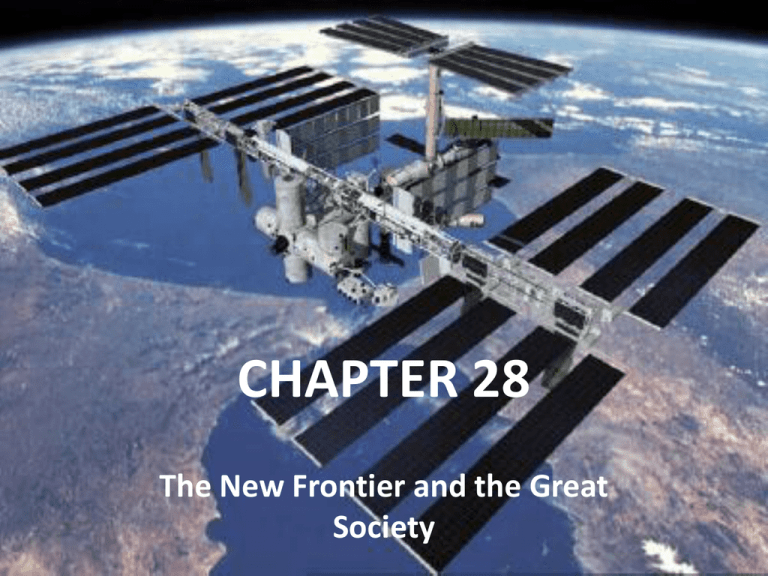
CHAPTER 28 The New Frontier and the Great Society 28-1 JFK and the Cold War The Election of 1960 KEY ISSUES OF THE ELECTION: Cold War Television Civil Rights THE CANDIDATES KENNEDY • Young , handsome, & charismatic • From wealthy/powerful family • Promised active leadership • Negatives– Youth/inexperience – Catholic NIXON • Experienced • Expert on foreign policy • Eisenhower’s VP—hoped to riding Eisenhower’s popularity • Negatives– Some Americans felt US was losing Cold War – Lack of visual appeal to voters TELEVISED DEBATE Sept. 26, 1960 – First televised debate between presidential candidates – Kennedy was coached by television producers—he looked and spoke better than Nixon • Launched television age of American politics CIVIL RIGHTS • October 1960- MLK Jr. was arrested in Georgia along with 33 other demonstrators for sitting/demonstrating at a segregated lunch counter – Demonstrators were released, but King was given months of hard labor for a “minor traffic violation” • Eisenhower refused to get involved/Nixon (VP • JFK called MLK’s wife, RFK persuaded judge to release MLK Jr. on bail – JFK won AA votes and key states in Midwest and South. CAMELOT • The Camelot Years – Kennedy’s youth and the appeal of his family along with his talented advisors (“The Best and the Brightest”) reminded many King Arthur’s mythical court—Camelot THE KENNEDY MYSTIQUE • JFK’s family fascinated the American public – JFK could read 1600 words/minute – Fashion and culture of Jackie Kennedy – Many pictures and stories in magazines and newspapers of Caroline and John THE BEST AND THE BRIGHTEST • JFK chose only the best to be his advisors: – McGeorge Bundy (Harvard Dean)—national security – Robert McNamara (Pres. of Ford)—Sec. of Def. – Dean Rusk (Pres. of Rockefeller Found.)– Sec. of State – RFK (35 y.o. brother)—Attorney General • Most trusted advisor NEW MILITARY STRATEGY • Kennedy did not feel Eisenhower did enough about the Soviet Union – Felt Soviets were gaining ground in 3rd world countries in Asia, Africa, and Latin America – Blamed Republicans for “allowing” communism in Cuba so close to US • Kennedy did not like the threat of all-out nuclear war to deter Soviet aggression— especially in a minor incident. • Kennedy FLEXIBLE RESPONSE – Increased military spending non-nuclear forces: • Troops, ships, artillery, Special Forces (Green Berets) – AND increased nuclear capabilities (3x the amount!) • READY FOR ANYTHING • . CRISES OVER CUBA • 2-weeks before Kennedy took office, Fidel Castro (communist) took power in Cuba • Castro promised democracy, but once in power did just the opposite – US cut off relations w/Cuba – Seized American and British oil fields – Castro relied more and more on aid from the Soviet Union • About 10% of Cuba’s pop. went into exile b/c they saw Castro as a tyrant dictator. BAY OF PIGS INCIDENT • CIA plan to train exiles to invade Cuba and remove Castro fails • Air strike failed to knock out Cuban air forces • Diversionary group failed to land • Heavily armed Cuban troops stopped invasion • Kennedy refused to authorize US air support • Kennedy took responsibility in public for the fiasco • EMBARRASSMENT TO UNITED STATES Cuban Missile Crisis • Krushchev (Soviet Union) promises to defend Cuba with weapons, including nuclear missiles • U-2 photographic evidence shows nuclear missile ready to launch • Kennedy informs the nation of the missiles • The world is gripped with fear of nuclear attack • US Navy blockades (quarantine) Cuba and Soviet ships turned back • Missiles removed – US pledge not to invade Cuba & makes a secret treaty to remove missiles from Turkey MOST DANGEROUS MOMENT OF COLD WAR?? Impact of Cuban Missile Crisis • Krushchev's prestige damaged • Kennedy criticized for using brinksmanship tactics • Kennedy too "soft" and lost chance to oust Castro • Angry Cuban exiles switch support to Republican Party Is this quotation still valid today? “Nuclear powers must avert those confrontations which bring an adversary to a choice of either a humiliating retreat or a nuclear war. To adopt that kind of course in the nuclear age would be evidence only of the bankruptcy of our policy—or of a collective death wish for the world” -John F. Kennedy, Speech at American University, 1963 Berlin Crisis • West Berlin's prosperous economy showcased success of western democracy while East Germany is suffering with a weak economy & lack of Civil Rights • Large numbers of East Germans flee to West Berlin • Berlin Wall constructed (1961) Easing Cold War Tensions • Hot Line – established between White House & Kremlin – diffuse potential crises/war quickly • Limited Test Ban Treaty: – banned nuclear testing in atmosphere New Frontier: Stimulate the Economy • Provide medical care to the aged, urban repair, education aid • Raised minimum wage to $1.25, extended unemployment • Paid for through deficit spending and an increase in taxes New Frontier: Addressing Poverty Abroad • Peace Corps – Assistance to developing nations • (Agricultural advisers, teachers, health aides, etc.) – GREAT SUCCESS!! • Alliance for Progress – economic and technical help for Latin America – Contain communism New Frontier: Race to the Moon • April 1961, Soviet Union put a man on the moon, US saw this as a challenge & was determined to win the Space Race • July 1969, US puts first man on the Moon • Impact of space program – Education: expanded science programs – Technology: computers and miniaturized electronics Assassination of JFK • November 22, 1963: Kennedy Assassinated in Dallas, Texas • Lee Harvey Oswald charged with the murder • Warren Commission – Found that Harvey acted alone • Zapruder Film http://www.youtube.com/watch?v=o_R4jLE_lJk

